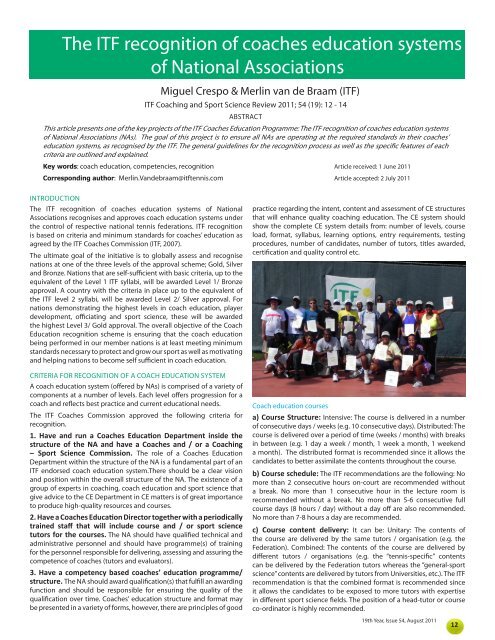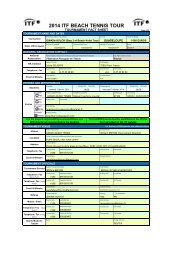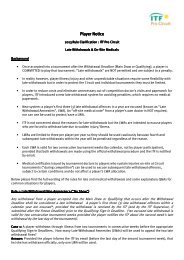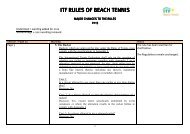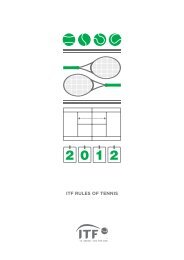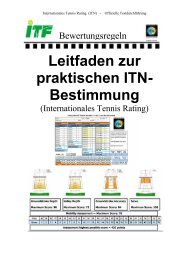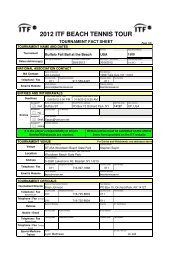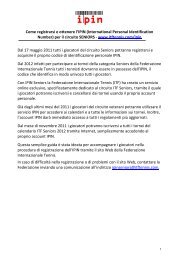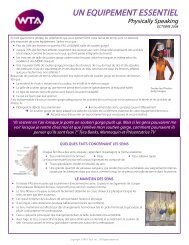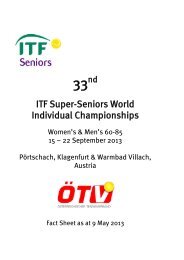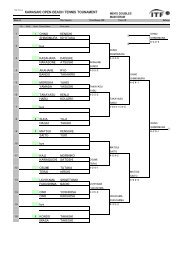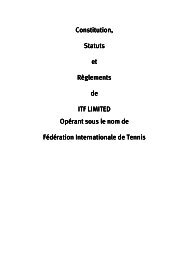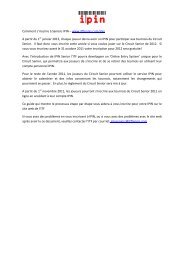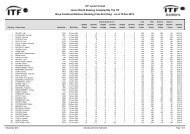Coaching & Sport Science Review - International Tennis Federation
Coaching & Sport Science Review - International Tennis Federation
Coaching & Sport Science Review - International Tennis Federation
Create successful ePaper yourself
Turn your PDF publications into a flip-book with our unique Google optimized e-Paper software.
The ITF recognition of coaches education systems<br />
of National Associations<br />
Miguel Crespo & Merlin van de Braam (ITF)<br />
ITF <strong>Coaching</strong> and <strong>Sport</strong> <strong>Science</strong> <strong>Review</strong> 2011; 54 (19): 12 - 14<br />
ABSTRACT<br />
This article presents one of the key projects of the ITF Coaches Education Programme: The ITF recognition of coaches education systems<br />
of National Associations (NAs). The goal of this project is to ensure all NAs are operating at the required standards in their coaches’<br />
education systems, as recognised by the ITF. The general guidelines for the recognition process as well as the specific features of each<br />
criteria are outlined and explained.<br />
Key words: coach education, competencies, recognition Article received: 1 June 2011<br />
Corresponding author: Merlin.Vandebraam@itftennis.com Article accepted: 2 July 2011<br />
INTRODUCTION<br />
The ITF recognition of coaches education systems of National<br />
Associations recognises and approves coach education systems under<br />
the control of respective national tennis federations. ITF recognition<br />
is based on criteria and minimum standards for coaches’ education as<br />
agreed by the ITF Coaches Commission (ITF, 2007).<br />
The ultimate goal of the initiative is to globally assess and recognise<br />
nations at one of the three levels of the approval scheme; Gold, Silver<br />
and Bronze. Nations that are self-sufficient with basic criteria, up to the<br />
equivalent of the Level 1 ITF syllabi, will be awarded Level 1/ Bronze<br />
approval. A country with the criteria in place up to the equivalent of<br />
the ITF level 2 syllabi, will be awarded Level 2/ Silver approval. For<br />
nations demonstrating the highest levels in coach education, player<br />
development, officiating and sport science, these will be awarded<br />
the highest Level 3/ Gold approval. The overall objective of the Coach<br />
Education recognition scheme is ensuring that the coach education<br />
being performed in our member nations is at least meeting minimum<br />
standards necessary to protect and grow our sport as well as motivating<br />
and helping nations to become self sufficient in coach education.<br />
CRITERIA FOR RECOGNITION OF A COACH EDUCATION SYSTEM<br />
A coach education system (offered by NAs) is comprised of a variety of<br />
components at a number of levels. Each level offers progression for a<br />
coach and reflects best practice and current educational needs.<br />
The ITF Coaches Commission approved the following criteria for<br />
recognition.<br />
1. Have and run a Coaches Education Department inside the<br />
structure of the NA and have a Coaches and / or a <strong>Coaching</strong><br />
– <strong>Sport</strong> <strong>Science</strong> Commission. The role of a Coaches Education<br />
Department within the structure of the NA is a fundamental part of an<br />
ITF endorsed coach education system.There should be a clear vision<br />
and position within the overall structure of the NA. The existence of a<br />
group of experts in coaching, coach education and sport science that<br />
give advice to the CE Department in CE matters is of great importance<br />
to produce high-quality resources and courses.<br />
2. Have a Coaches Education Director together with a periodically<br />
trained staff that will include course and / or sport science<br />
tutors for the courses. The NA should have qualified technical and<br />
administrative personnel and should have programme(s) of training<br />
for the personnel responsible for delivering, assessing and assuring the<br />
competence of coaches (tutors and evaluators).<br />
3. Have a competency based coaches’ education programme/<br />
structure. The NA should award qualification(s) that fulfill an awarding<br />
function and should be responsible for ensuring the quality of the<br />
qualification over time. Coaches' education structure and format may<br />
be presented in a variety of forms, however, there are principles of good<br />
practice regarding the intent, content and assessment of CE structures<br />
that will enhance quality coaching education. The CE system should<br />
show the complete CE system details from: number of levels, course<br />
load, format, syllabus, learning options, entry requirements, testing<br />
procedures, number of candidates, number of tutors, titles awarded,<br />
certification and quality control etc.<br />
Coach education courses<br />
a) Course Structure: Intensive: The course is delivered in a number<br />
of consecutive days / weeks (e.g. 10 consecutive days). Distributed: The<br />
course is delivered over a period of time (weeks / months) with breaks<br />
in between (e.g. 1 day a week / month, 1 week a month, 1 weekend<br />
a month). The distributed format is recommended since it allows the<br />
candidates to better assimilate the contents throughout the course.<br />
b) Course schedule: The ITF recommendations are the following: No<br />
more than 2 consecutive hours on-court are recommended without<br />
a break. No more than 1 consecutive hour in the lecture room is<br />
recommended without a break. No more than 5-6 consecutive full<br />
course days (8 hours / day) without a day off are also recommended.<br />
No more than 7-8 hours a day are recommended.<br />
c) Course content delivery: It can be: Unitary: The contents of<br />
the course are delivered by the same tutors / organisation (e.g. the<br />
<strong>Federation</strong>). Combined: The contents of the course are delivered by<br />
different tutors / organisations (e.g. the “tennis-specific” contents<br />
can be delivered by the <strong>Federation</strong> tutors whereas the “general-sport<br />
science” contents are delivered by tutors from Universities, etc.). The ITF<br />
recommendation is that the combined format is recommended since<br />
it allows the candidates to be exposed to more tutors with expertise<br />
in different sport science fields. The position of a head-tutor or course<br />
co-ordinator is highly recommended.<br />
19th Year, Issue 54, August 2011<br />
12


